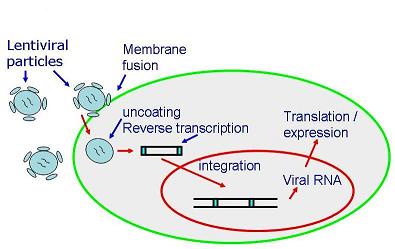Channels
Special Offers & Promotions
Highly Reproducible Gene Delivery
 AMSBIO have announced a range of ready-to-use lentivirus supernatant products suitable for many kinds of gene delivery applications including mammalian protein expression, stable cell line construction, cell signal pathway localization and stem cell research.
AMSBIO have announced a range of ready-to-use lentivirus supernatant products suitable for many kinds of gene delivery applications including mammalian protein expression, stable cell line construction, cell signal pathway localization and stem cell research.Prepared using proprietary protocols to integrate a real-time fluorescence monitoring tag in the system - each 200ml vial of AMSBIO lentivirus supernatent contains a high titre of highly transducible lentivirus (1 x 10 e7 IFU/ml). Each vial of lentiviral supernatent particles contains a fully sequence verified target, ready for transduction into any mammalian cells. All AMSBIO lentivirus supernatent products are easy and safe to use, simply add 50ul into the cultured cells, and you will be able to confirm the specific target's expression under a fluorescent microscope after 48-72 hours.
The AMSBIO lentiviral system is a gene delivery tool using lentivectors for gene expression or knockdown. Lentivirus can effectively transduce both dividing and non-dividing mammalian cells, and integrate into the host genome, allowing stable long-term, high-level gene expression both in vivo and in vitro. Unlike traditional retroviral system, AMSBIO lentivirus is much more actively imported into the nuclei of non-dividing cells and stably integrated into the host cell's genome independent of cell cycle. Although adenovirus is also able to transduce non-dividing cells, it is only for transient expression because it cannot integrate into host cell's genome.
For further information visit www.amsbio.com/custom-lentivirus-service.aspx and www.amsbio.com/Gentarget.aspx or contact AMSBIO on tel. +44-1235-828200
Founded in 1987, AMS Biotechnology (AMSBIO) is recognised as a leading international provider of unique & innovative products & custom services for life sciences research. The AMSBIO range includes over 23,000 polyclonal & monoclonal antibodies, peptides, recombinant proteins, extracellular matrix, molecular detection reagents, & tissue DNA, RNA, protein & microarray products. Key research areas include: apoptosis, cell invasion & migration, cell signaling, DNA damage, electrophoresis, glycobiology, posttranslational modification & stem cell biology.
Media Partners


